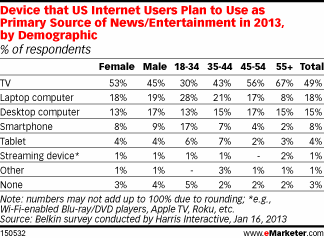In Nielsen’s U.S. Digital Consumer Report, we were given a glimpse of the extent consumers are connected while watching TV. The
world’s greatest attention magnet now meets the world’s coolest digital
water cooler.What’s clear is that connected consumers are also seasoned
multi-taskers. When asked what they’re doing on their devices while
watching TV, the top 3 activities included:
1. Checked email - 57%
2. Surfed the Web - 44%
3. Visited a social network - 44%
The study hinted that there's still hope for
advertisers, though. 19% of smartphone and tablet owners searched
for product information while 16% looked up coupons or deals.

